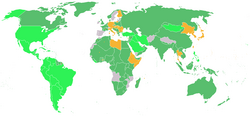Template: Popular article 10 8
From New World Encyclopedia
Revision as of 22:51, 28 September 2015 by Jennifer Tanabe (talk | contribs) (Created page with "{{Main page article box| type=Popular| title=Allied Powers (World War II)| image_name=WWII.png| image_desc= World Map with the participants in World War II| text=The '''Al...")
Popular Article: Allied Powers (World War II)

World Map with the participants in World War II
The Second World War's opposing alliances pitted strong democracies against totalitarian regimes. The conflict and the two sets of alliances can be seen as representing a struggle between freedom and tyranny, although there was some movement between the two alliances. For example, Italy, Hungary, and Romania were among those nations that switched from Axis to the Allied Powers towards the end of the war. This was less because they wanted to side with the victors than because they had been initially coerced into joining the Axis Powers. Members of the Provisional Government for Free India joined the Axis, fighting with Japanese forces more to express its opposition to Britain's colonial rule than because it saw Japan as a natural ally.
The Allies, who won, were also the architects of the United Nations, an international, inter-governmental organization whose goal is to resolve conflicts peacefully and to establish a world of peace, freedom, and justice for all. They signed the Declaration by the United Nations on January 1, 1941, stating that a complete victory against their adversaries was necessary if "life, liberty, independence and religious freedom" were to be defended, human rights and justice preserved in "their own lands as well as in other lands, and that they [were] engaged in a common struggle against savage and brutal forces seeking to subjugate the world." Almost all the founding members of the UN had been anti-Axis during the war. Many of the Allies of World War II were also co-founders of the North Atlantic Treaty Organization (NATO) in 1949.